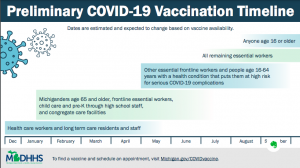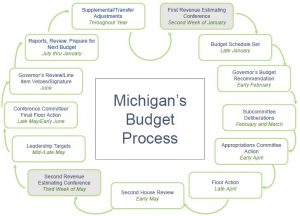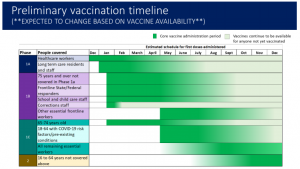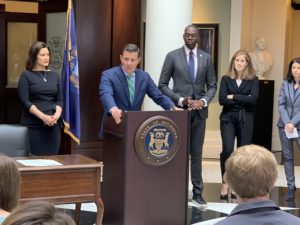State leaders ‘pleased’ with vaccine progress
 During a hastily arranged video briefing for county leaders and others on Thursday, senior staffers of the Whitmer administration insisted that the distribution of COVID-19 vaccines is accelerating.
During a hastily arranged video briefing for county leaders and others on Thursday, senior staffers of the Whitmer administration insisted that the distribution of COVID-19 vaccines is accelerating.
Chief Medical Executive Dr. Joneigh Khaldun said she was “pleased” with the progress made to date. Data shared this week showed fewer than 900,000 doses of vaccine had been given to residents or were scheduled for delivery. The state’s goal is to vaccinated 5.6 million people, or 70 percent of the state’s population that is age 16 or older.
Among other points made during the briefing, which did not allow time for Q&A:
- The limiting factor right now is the supply of vaccines to Michigan
- Supply issues have forced the state to scale back its original plan to delivery 60,000 doses per day
- The state is following federal guidance on vaccine protocols and schedules
- The phases for which groups gain access when (see newest chart above) always were expected to overlap each other, meaning that some members of a later vaccine group could be getting vaccinated even if not everyone in an earlier group had finished their vaccinations
- Providers are asked to get 90 percent of their available doses in arms within seven days
- For most employers, vaccine access will be “more complicated” than it is with initial groups such as nursing home residents and health workers; the state is working with local health departments, pharmacies and others to speed the process
- Those vaccinated still need to mask, distance, etc. until a large share of the state’s population is covered
For the latest information on the state’s vaccine plans, visit this website.
Biden relief plan includes $350 billion in aid to states and locals
 A proposed COVID-19 relief package from President-elect Joe Biden includes $350 billion in critical aid to state, local and territorial governments, the National Association of Counties reported Thursday.
A proposed COVID-19 relief package from President-elect Joe Biden includes $350 billion in critical aid to state, local and territorial governments, the National Association of Counties reported Thursday.
Additional details are expected soon on the next potential round of COVID-19 federal relief is called the American Rescue Plan, a two-part strategy focusing on rescue and recovery.
“We thank President-elect Biden for introducing a plan that recognizes the vital, frontline role of America’s counties in mitigating and ending the COVID-19 pandemic. For our county leaders, our focus remains on ensuring the public health, personal safety and economic wellbeing of our residents,” said NACo Executive Director Matthew Chase.
America’s 3,069 county governments support more than 1,900 local public health departments, nearly 1,000 hospitals and critical access clinics, more than 800 long-term care facilities and 750 behavioral health centers.
Additionally, county governments are responsible for emergency operations centers and 911 services, court and jail management, public safety and emergency response, protective services for children, seniors and veterans, and the “last of the first responders” with coroners and medical examiners, among many other essential public services.
NACo’s coronavirus online hub includes county level examples of response efforts, interactive maps and analyses of federal actions.
Legislature opens for 101st session
 The 101st Legislature kicked off session on Wednesday with the swearing in of members, adoption of chamber rules and introduction of bills.
The 101st Legislature kicked off session on Wednesday with the swearing in of members, adoption of chamber rules and introduction of bills.
The House rules have new limited remote capabilities for members. Under HR 1, members of a committee may participate, but not vote on any bill, resolution or motion before the committee. The chair and clerk of the committee must be physically present.
New committees were also created, but committee chairs and members have not been announced. The chamber will continue a modified 2-committee process, as the new Rules and Competitiveness Committee will be similar to last term’s Ways and Means Committee, but not all bills will have to go through it to reach the floor.
The first bill introduced this session, House Bill 4001, by House Speaker Pro Tem Pamela Hornberger (R-Macomb), would prohibit a legislator’s ability to vote on a bill when a conflict of interest exists.
The Senate also opened its 2021-22 session with a second attempt to cap emergency orders issued by the Department of Health and Human Services at 28 days and requiring legislative approval for an extension. Senate Bill 1, sponsored by Sen. Lana Theis (R-Livingston) was referred to the Government Operations Committee, chaired by Senate Majority Leader Mike Shirkey (R-Jackson).
Other notable bills, either newly introduced or reintroduced due to incompletion last term, that counties should follow include:
- SB 10 (Theis): Allows veteran services boards to hold closed sessions when interviewing veterans’ applications for benefits
- SB 11 (Theis): Mandates the CPL licenses must be processed during a declared emergency
- SBs 14-15 (Zorn): Allow a prosecutor to bring charges in the drug-overdose death of a resident in the county, even if the illegal drugs were purchased in another county
Revenue Conference sees stable General Fund; low inflation
 Michigan’s Revenue Estimating Conference met Friday as part of the state’s annual budget process and adopted a consensus report for the fiscal years of 2021-2023 that will be marked by a relatively stable General Fund and low inflation for the general economy.
Michigan’s Revenue Estimating Conference met Friday as part of the state’s annual budget process and adopted a consensus report for the fiscal years of 2021-2023 that will be marked by a relatively stable General Fund and low inflation for the general economy.
While significant job gains are expected in the three-year period, they will not be equal to the number of jobs lost in 2020 due to the pandemic.
The General Fund — key because it is the source of county revenue sharing payments each year — will be total between $10 billion and $11 billion each year for the three-year period. the $10 billion mark, as it has been for several years.
Strong performance in home sales in recent months should result in property tax value “pop ups” under Proposal A in locations that can do Headlee rollbacks.
 The 10th webinar in a series co-sponsored by MAC, the Michigan Treasury and other local government groups will be held on Tuesday, Jan. 19 from 2 p.m. to 3 p.m.
The 10th webinar in a series co-sponsored by MAC, the Michigan Treasury and other local government groups will be held on Tuesday, Jan. 19 from 2 p.m. to 3 p.m.
Topics will include an overview of the Michigan Consensus Revenue Estimating Conference and information regarding the requirements for single audits.
Participants can register and submit questions on the webinar’s registration page.
Additionally, the Michigan Department of Treasury has developed a webpage with numbered letters, memorandums, webinars and resources regarding COVID-19 updates for local governments and school districts. This webpage was created to ensure that Michigan communities have access to the most up-to-date guidance and is updated frequently with information and resources as they become available. A recorded copy of this webinar and the PowerPoint will be made available within 24 hours after the webinar is completed on this webpage.
Treasury sets next ‘Chart Chat’ for Jan. 28
 The Michigan Department of Treasury is pleased to announce our next “Chart Chat” webinar at 2 p.m. on Thursday, Jan. 28.
The Michigan Department of Treasury is pleased to announce our next “Chart Chat” webinar at 2 p.m. on Thursday, Jan. 28.
The Chart Chat Webinar Series provides updates to local government officials on accounting-related topics, updates from the Michigan Department of Treasury and information on sound fiscal management. Participation is valuable for any local government employee, including clerks, treasurers, elected officials, finance directors, city, township, or village managers, auditors and accounting staff, among others.
This Chart Chat webinar will cover:
- Changes to the Uniform Chart of Accounts
- F-65 Annual Local Unit Fiscal Report uses and problems
- How to monitor fiscal health using general fund balance indicators
- What local governments need to know about single audits
To register, please visit https://chartchat.eventbrite.com.
To submit questions for the Q&A section, email LAFD_Audits@Michigan.gov by Friday, Jan. 22.
Sweeney joins MAC’s Governmental Affairs Team
 Hannah Sweeney, an Ubly native with legislative staff experience and a public policy degree from Michigan State University, will join MAC in January as governmental affairs assistant.
Hannah Sweeney, an Ubly native with legislative staff experience and a public policy degree from Michigan State University, will join MAC in January as governmental affairs assistant.
“Hannah will be a great addition to Governmental Affairs Team,” said Deena Bosworth, director of governmental affairs. “She has a background in education public policy and is looking forward to translating that into tackling the issues our counties face in a daily basis.”
“I am excited to join MAC and advocate for all 83 counties in Michigan,” Sweeney said. “I wanted to work with the organization to bridge the gap between the state and local governments to ensure every community receives the resources that are needed.”
Sweeney has a bachelor’s degree in political science from Saginaw Valley State University and a master’s in public policy from Michigan State University. She also served as a policy fellow at the Institute of Public Policy and Social Research at Michigan State University and has worked in two legislative offices. She can be reached at sweeney@micounties.org.
 MAC offices will close for MLK Holiday
MAC offices will close for MLK Holiday
Please note that MAC’s offices and operations will be closed on Monday, Jan. 18 to observe the Martin Luther King, Jr. holiday.
MAC will resume normal operations on Tuesday, Jan. 19 at 8 a.m. Of course, if you have an emergency need, you may contact the relevant MAC staffer by cell.
County Government Guide still available at a discount
 Copies of the Fifth Edition of the Guide to Michigan County Government are still available at discounted pricing, MSU Extension announced this week.
Copies of the Fifth Edition of the Guide to Michigan County Government are still available at discounted pricing, MSU Extension announced this week.
The guide is the definitive published source for background and materials on county government in Michigan and is on every desk at MAC’s Lansing headquarters.
The discounts are:
- Code MIGOV for 25% off on single copies
- Automatic 30% off for orders of 4 copies or more
The discounts continue through May 31.
To order, go to https://shop.msu.edu/product_p/bulletin-e3209.htm
DNR sets recreation grants workshop for Jan. 21
 The Michigan Department of Natural Resources is hosting a virtual recreation grants workshop on Jan. 21 to assist you in applying for funding through the Natural Resources Trust Fund, Land and Water Conservation Fund and Recreation Passport Grant Programs. The workshop covers the process and requirements to apply for grants supporting the acquisition or development of a public outdoor recreation facility.
The Michigan Department of Natural Resources is hosting a virtual recreation grants workshop on Jan. 21 to assist you in applying for funding through the Natural Resources Trust Fund, Land and Water Conservation Fund and Recreation Passport Grant Programs. The workshop covers the process and requirements to apply for grants supporting the acquisition or development of a public outdoor recreation facility.
There is no cost to participate, but registration is required. You can register to attend the workshop on the DNR’s Website or by clicking here. A recording of the workshop will also be made available following the event on the DNR’s recreation grants workshop page.
 Staff picks
Staff picks
- Michigan’s slow economic momentum is not wholly reflected in measures of fiscal stress (Citizens Research Council of Michigan)
- MapLab: Bearing witness to Native land (Bloomberg News)
- State capitols across the nation face security gaps (Governing)
- The State of Online Harassment (Pew Research)

 State leaders announced this week
State leaders announced this week  A huge legislative package of reforms suggested by a joint county-state task force on jail policies was signed into law recently by Gov. Gretchen Whitmer.
A huge legislative package of reforms suggested by a joint county-state task force on jail policies was signed into law recently by Gov. Gretchen Whitmer. A push by the retail giant Meijer for a sales, use and Personal Property Tax (PPT) exemption for large retailers who are installing and utilizing automation equipment to assist with their distribution systems failed this week after the clock ran out for Gov. Gretchen Whitmer to sign it, thereby creating a “pocket vote.”
A push by the retail giant Meijer for a sales, use and Personal Property Tax (PPT) exemption for large retailers who are installing and utilizing automation equipment to assist with their distribution systems failed this week after the clock ran out for Gov. Gretchen Whitmer to sign it, thereby creating a “pocket vote.” Solar equipment tax bill rejected by governor
Solar equipment tax bill rejected by governor County officials are invited to attend a kickoff meeting led by the Federal Aviation Administration (FAA) on new rules governing the use of drones.
County officials are invited to attend a kickoff meeting led by the Federal Aviation Administration (FAA) on new rules governing the use of drones. Ottawa County Administrator Al Vanderberg was recently named a recipient of the
Ottawa County Administrator Al Vanderberg was recently named a recipient of the  The U.S. Treasury just released information for the new $25 billion emergency rental assistance program authorized under the
The U.S. Treasury just released information for the new $25 billion emergency rental assistance program authorized under the  A
A  The Legislature voted to extend the ability for local boards to meet remotely, under any circumstance, through March 31, 2021.
The Legislature voted to extend the ability for local boards to meet remotely, under any circumstance, through March 31, 2021.  Revised public health orders announced Friday loosen some restrictions on public activity while extending the state’s COVID-19 response to Jan. 15, 2021.
Revised public health orders announced Friday loosen some restrictions on public activity while extending the state’s COVID-19 response to Jan. 15, 2021.
 MAC-supported bills to address a court decision that upended the tax foreclosure system on property in Michigan were approved by the Legislature this week.
MAC-supported bills to address a court decision that upended the tax foreclosure system on property in Michigan were approved by the Legislature this week. At its last meeting of 2020 this week, the Michigan Indigent Defense Commission (MIDC) approved a final set of local proposals for spending plans to defend indigent residents accused of crimes.
At its last meeting of 2020 this week, the Michigan Indigent Defense Commission (MIDC) approved a final set of local proposals for spending plans to defend indigent residents accused of crimes.
 For the better part of 2020, the House and the Senate have been working on a bill to forgive the penalties and interest for those who could not afford to make their summer property tax payments.
For the better part of 2020, the House and the Senate have been working on a bill to forgive the penalties and interest for those who could not afford to make their summer property tax payments. Final legislative approval was given this week to
Final legislative approval was given this week to  Bills that the Michigan County Medical Care Facilities Council (MMCFC) has been tracking for many months cleared the Legislature this week.
Bills that the Michigan County Medical Care Facilities Council (MMCFC) has been tracking for many months cleared the Legislature this week.  Barry County Commissioner Dan Parker died Dec. 11 after contracting COVID-19
Barry County Commissioner Dan Parker died Dec. 11 after contracting COVID-19 A new set of free “Managing Mental Health Crisis” sessions will begin in early January. County officials have until Jan. 5, 2021, to register for:
A new set of free “Managing Mental Health Crisis” sessions will begin in early January. County officials have until Jan. 5, 2021, to register for:
 The Michigan House of Representatives largely ground to a halt this week as additional COVID-19 cases and exposures were reported around House members and staff.
The Michigan House of Representatives largely ground to a halt this week as additional COVID-19 cases and exposures were reported around House members and staff. MAC Executive Director Stephan Currie led the Podcast 83 team through a review of legislative activity as 2020 comes to a close in the latest episode of Podcast 83 on Dec. 7.
MAC Executive Director Stephan Currie led the Podcast 83 team through a review of legislative activity as 2020 comes to a close in the latest episode of Podcast 83 on Dec. 7. Wayne County Commissioner Jewel Ware died unexpectedly this week from a heart attack.
Wayne County Commissioner Jewel Ware died unexpectedly this week from a heart attack. Protect your work environment and increase peace of mind for you and your team. Join MAC, CoPro+ and SPACE for a short webinar to help you and your employees “Stay Safe, Stay Working and Move Forward.” The webinar will run from 3:30 p.m. to 5 p.m. Eastern on Thursday, Dec. 17.
Protect your work environment and increase peace of mind for you and your team. Join MAC, CoPro+ and SPACE for a short webinar to help you and your employees “Stay Safe, Stay Working and Move Forward.” The webinar will run from 3:30 p.m. to 5 p.m. Eastern on Thursday, Dec. 17. In the latest Treasury webinar in a series co-sponsored by MAC and others, state experts detailed projections for the economy in 2021 and 2022, emphasizing that a rebound in those years should be robust from the effects of the coronavirus pandemic.
In the latest Treasury webinar in a series co-sponsored by MAC and others, state experts detailed projections for the economy in 2021 and 2022, emphasizing that a rebound in those years should be robust from the effects of the coronavirus pandemic. In another special LIVE video edition of Podcast 83 at 3 p.m. on Dec. 7, MAC’s Executive Director Stephan Currie and MAC’s advocacy team will discuss the ongoing “lame duck” session of the Michigan Legislature.
In another special LIVE video edition of Podcast 83 at 3 p.m. on Dec. 7, MAC’s Executive Director Stephan Currie and MAC’s advocacy team will discuss the ongoing “lame duck” session of the Michigan Legislature. The key panels that drive MAC’s policy positions in Lansing and Washington, D.C., are looking for new members to join their ranks in January.
The key panels that drive MAC’s policy positions in Lansing and Washington, D.C., are looking for new members to join their ranks in January. In a live webinar on Friday, Dec. 11, county leaders can gain the knowledge and skills required to provide effective, equitable service to people with intellectual and/or developmental disabilities, including autism spectrum disorder.
In a live webinar on Friday, Dec. 11, county leaders can gain the knowledge and skills required to provide effective, equitable service to people with intellectual and/or developmental disabilities, including autism spectrum disorder.




